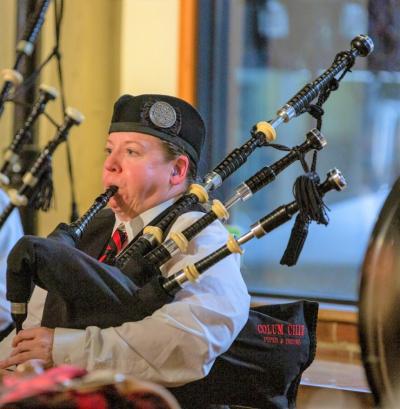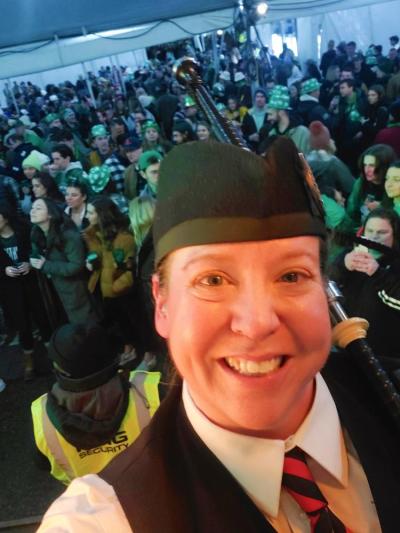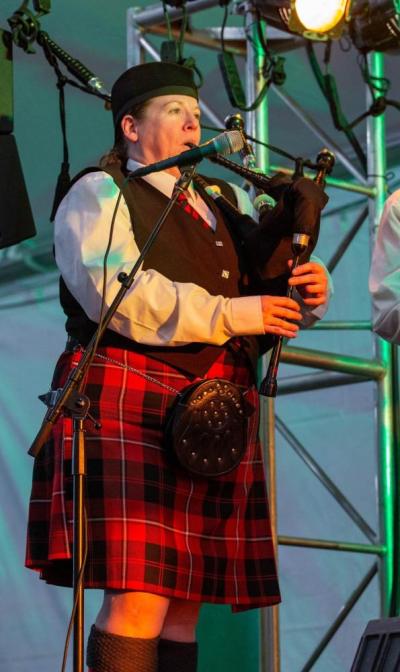For ‘Beth the Bagpiper,’ St. Patrick’s concerts are March madness
When Beth Butts told her husband Mike that she wanted bagpipe lessons for her 40th birthday, his response was too obscene to be printed in this newspaper.
That was in 2017. Mike is now strongly supportive of his wife’s hobby, which she jokingly calls her “midlife crisis.” Bagpipe lessons, Butts says, are cheaper than a sports car.
As “Beth the Bagpiper,” Butts has performed in 15 bars, clubs, parades and nursing homes throughout Massachusetts and Rhode Island in the month of March alone. Saint Patrick’s Day is the busiest time of year for her and her band, the Sandwich-based Colum Cille Pipes and Drums.
“You kind of just have to push through it,” she said. “At the beginning of the month, you’re nervous, you’re a little excited. You’re looking at the schedule and think, ‘Oh my, I don’t know how I’m going to get through this and still have a full-time job and a family.’”
She works as a training analyst for the T. Marzetti Company, which owns the Chatham Village Croutons factory on Kendrick Road. Her “family” consists of Mike and their nine adopted animals; one dog, two cats, a rabbit, four birds and a horse (“The horse actually lives in Middleboro,” Butts explained.)
The animals are not bothered by the sound of her practicing.
“They’re used to it,” she said.
It doesn’t bother Mike either. When she’s through with her morning practice, he’ll shout “That one sounded good, honey!” from the next room.
Growing up in Middleboro, Butts’s father taught her to be fiercely proud of her Scottish heritage. Her mother taught her to be fiercely proud of her Irish heritage. Every year, her parents would fight “The Green and Orange War,” competing to create the most elaborate and patriotic holiday display. Butts and her father won the war when they put two dots of orange food coloring on their cat. Her mother was planning to put green food coloring on the family cat, but they beat her to it.
In an environment like that, it was hard for Butts not to have bagpipes on the brain.
“I always loved them,” she said. “The sound kind of calls to you. There’s something celebratory yet mournful at the same time. It really strikes your soul.”
When she went to Scotland shortly before her 40th birthday, her love of bagpipes “reignited.” She began taking private lessons.
“Until you’ve held a set of bagpipes, you have no idea what you’re in for,” she said. “It doesn’t come naturally.”
The bags come in different sizes, depending on the size of the player. As the piper breathes into the blowpipe, the bag fills with air. When the piper squeezes the bag, the air gets pushed through three drones, which each have a reed. The music comes from the chanter, the rod with holes in it that the piper plays.
“It’s the squeezing action that causes the actual music,” Butts said. “The trick, that sounds easy but actually isn’t, is making sure the relationship between blow and squeeze is constantly balanced.”
At first, Butts became frustrated trying to hold the bagpipes, let alone trying to play them. She calls them “the most humbling instrument.”
To this day, she believes that when playing the bagpipes, true perfection is unachievable.
“One day you get it,” she said, “and when you click, it clicks.”
It “clicked” for Butts when she received a thumbs up from one of her bandmates.
“The downside of when it clicks,” she said, “is that you can hear when it’s not happening.”
Despite being synonymous with Scotland, the first bagpipes were played by ancient Egyptians. Their first confirmed appearance in Scotland dates back to 1396. The national bagpipes of Ireland are the uilleann pipes, but most Saint Patrick’s Day parades feature Irish music played on Scottish bagpipes.
“It’s a really strange instrument when you think about it,” Butts said.
Due to their status as an instrument of war, it was historically rare for women to play the bagpipes. In Scotland, female pipers could not perform against men in solo competition until 1976.
“Even some people younger than me are shocked to see women playing bagpipes,” Butts said.
She recalled that at a recent concert in Warren, Rhode Island, one woman was “in tears” seeing other women on the bagpipes.
Butts wants people to know that bagpipes are not just for funerals anymore. She wants to make bagpipes “approachable,” and is always happy to answer questions about the instrument.
“Nobody’s really ambivalent about bagpipes,” one of her former instructors told her. “You either love them or you hate them.”
Her father likes to joke that the sound of bagpipes is like the sound of 100 cats getting their tails stepped on.
“As a piper, I think it’s important not to take yourself too seriously,” she said. “Try to have fun with it. If you’re not having fun, the people you’re playing for won’t have fun.”
That’s why her setlist includes songs like the Dropkick Murphys’ “I’m Shipping Up to Boston” alongside mainstays like “Danny Boy” and “Scotland the Brave.”
“Standing on a stage at Harpoon [Brewery and Beer Hall] in Boston, having 6,000 people cheer for you while you’re playing ‘Shipping Up to Boston’ on bagpipes, is pretty stinking cool,” she said.
















